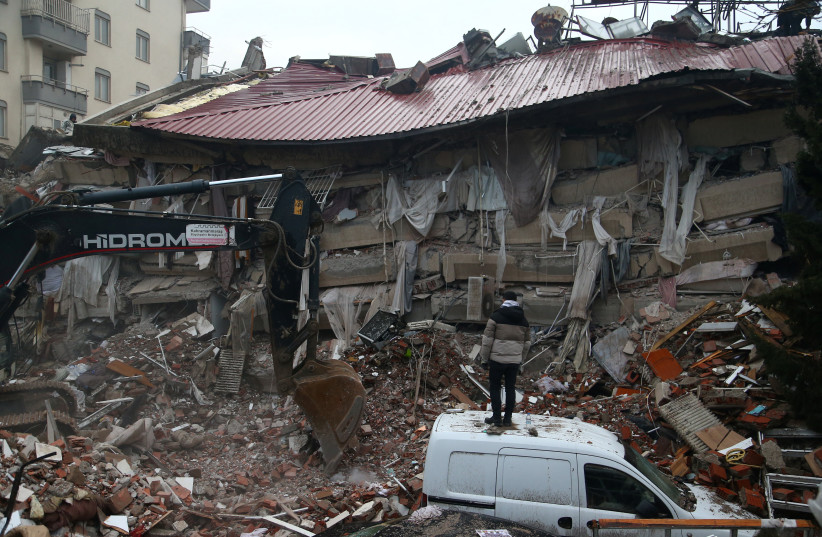The February 6 earthquake killed 5,000 people in Syria, with many more missing and buried in the rubble. Syria’s victims are concentrated in the northwest, which is controlled by Turkish-backed Islamists with whom Damascus has been at war since 2011.
Not only does the Syrian government turn a blind eye to the misery of its Sunni citizens but it impedes humanitarian access to Kurds in the earthquake zone west of the Euphrates River. Kurds are caught between the racist regime of Bashar Assad and hateful Islamists who want to punish the Kurds for being secular and pro-Western.
Assad and his backers in Tehran and Moscow are playing politics with humanitarian assistance. Syrian officials assert they have sole responsibility for the delivery of aid even in rebel-controlled areas where Assad is reviled. Humanitarian assistance is not getting to those who need it most.
Western governments have signaled their displeasure with Damascus. The UK recently issued a warning that aid sent to Syria risks being stolen and falling into the wrong hands. The US also rejects channeling aid through Damascus. Donors are wary of the government’s rampant corruption and politicization of assistance.
Damascus is trying to coax donors by opening two new crossings with Turkey, ostensibly expanding humanitarian access to northwestern Syria. Damascus has only allowed aid to enter the region through one border crossing to northwest Syria because it is concerned about undermining Syrian sovereignty and reducing prospects of regaining control of the region.

Turkey’s alignment with rebel groups exacerbates the humanitarian emergency. Turkey is hardly in a position to help. Crossborder routes have been damaged from the earthquake, as well as more than a decade of armed conflict.
Subject to constant bombardment from Russian warplanes, up to four million people in war-ravaged Syria were dependent on aid from across the border before the earthquake. Logistical challenges resulting from the earthquake have compounded difficulties in delivering life-saving supplies, with snow and extreme winter conditions rendering the roads all but impassable.
The greatest problem is financial. According to the UN Office for the Coordination of Humanitarian Affairs, the mechanism created by the UN to manage humanitarian activities – the Cross-Border Humanitarian Fund for Syria – is seriously underfunded. Launched on February 14, it issued an appeal for $398.7 million (NIS 1.5 billion). To date, however, only $2.1 m. (NIS 7.7 m.) has been contributed. Financing shortfalls and the politicization of assistance have left 20 million Syrians with next to nothing.
IRAN IS uncaring and opportunistic. It has no qualms about collaborating with the regime. Tehran prefers to provide aid bilaterally rather than via UN agencies. Iranian Shi’ites and Syria’s Alawite leadership share ideological affinities. When an Iranian transport plane carrying 40 tons of food and medicine arrived at Aleppo International Airport last week, supplies were handed over to the regime in support of the state’s relief efforts. The transfer was widely covered in state-controlled media, turning the delivery into a propaganda victory for both Assad and Tehran.
Kurds are caught in the middle of Syria’s disaster.
Afrin and Kurdish communities west of the Euphrates River have already suffered from Turkey’s ethnic cleaning, carried out by Islamist militias with support from Turkey. The militias block heavy equipment from accessing Kurdish communities. They left the Kurds to die under the rubble of hunger and cold.
When earth-moving equipment could have pulled pull people from the rubble, they only rescued Arabs and left the Kurds. They also blocked medical treatment for Kurds injured by the quake. “Islamists first” guides their callous and inhuman approach.
Turkey blocked cross-border aid to devastated Kurdish areas for five days after the earthquake. A resident of Jinderes notes, “[Turkish-backed Arab and Turkmen groups] brought food to the quake-afflicted people but the first question asked was whether they are Arab or Kurd. If they were Kurds they wouldn’t give them food. It is the same thing regarding burying the dead. They asked people whether they are Kurds or Arabs, if they were Kurds they would refuse to bury them.”
I have proposed “earthquake diplomacy,” hoping that the tremor would encourage opposing groups to set aside their differences and cooperate. This proposal has fallen on deaf ears. Parties to the conflict are inveterate in their hatred for one another and inflexible even under today’s dire conditions.
Russia, Iran, Turkey and Syria constitute an axis of malevolent powers more interested in promoting their narrow national interests than addressing the suffering of people devastated by the earthquake. Their toxic neglect exacerbates the suffering of earthquake victims. Shame on them for lacking compassion and seeking benefit from the misery of others. They deserve retribution for their crimes of inhumanity.
The writer is the director of the Program on Peacebuilding and Human Rights at Columbia University.
